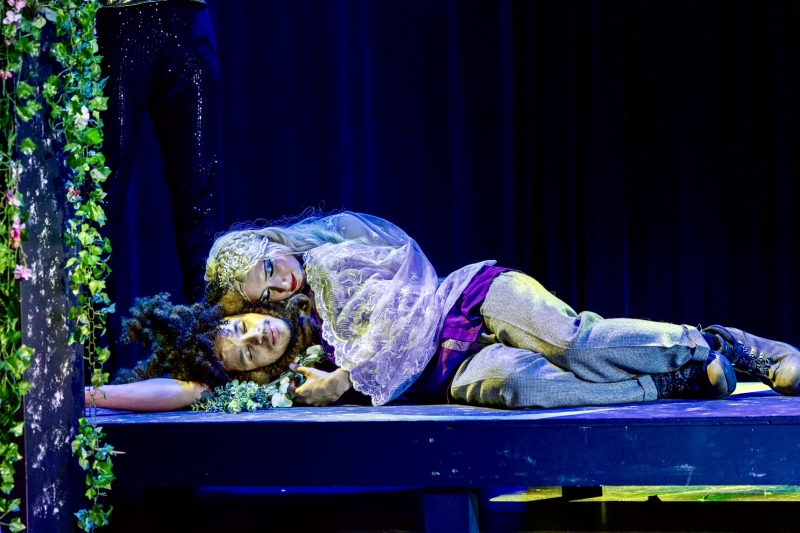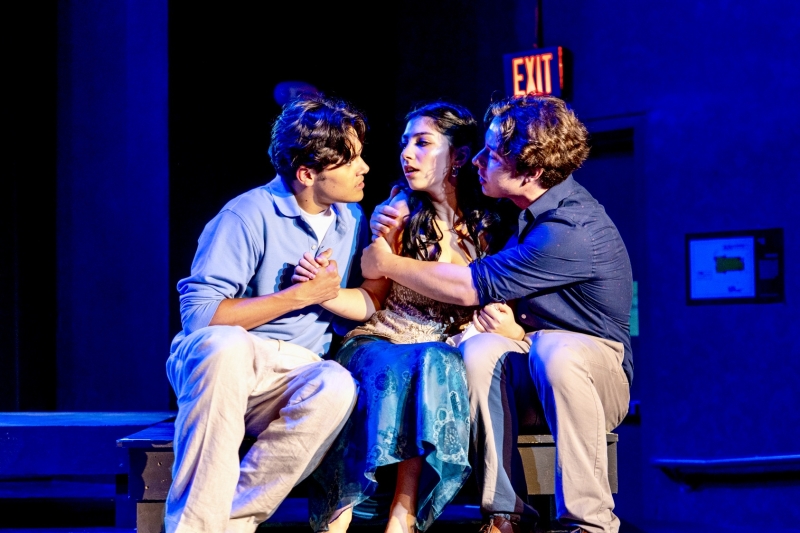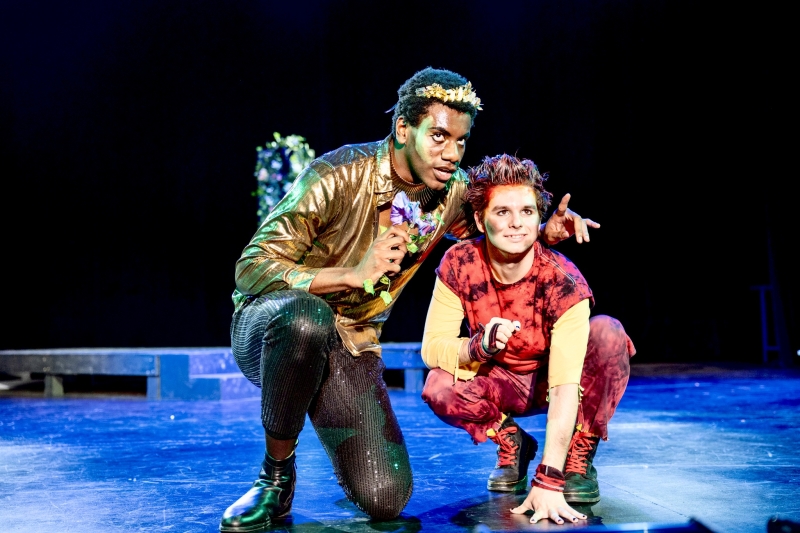Review: A MIDSUMMER NIGHT'S DREAM at UT Department Of Theatre And Dance
Now playing at the Laboratory Theatre through NOVEMBER 1, 2024

"The course of true love never did run smooth" - Lysander, Act 1 Scene 1
The University of Texas' production of A Midsummer Night’s Dream revitalizes the classic play with a modern twist that resonates with today’s audience. It brilliantly balances whimsical elements with deeper themes, creating an engaging experience for both seasoned Shakespeare enthusiasts and newcomers.
For those unfamiliar with the story (where have you been for the last five centuries?), the plot unfolds through interconnected narratives, weaving together the lives of four Athenian lovers, the fairy king Oberon and his queen Titania, and a group of amateur actors led by the bumbling Nick Bottom. As the characters venture into the enchanted forest, their intertwined fates lead to a chaotic yet hilarious series of misunderstandings, fueled by magical interventions.
Shakespeare’s genius lies not only in the richness of the text but also in the timeless themes conveyed throughout the play. At its heart, A Midsummer Night's Dream explores love and transformation. The narrative artfully dissects love’s irrationality, capriciousness, and transformative power. The relationships between Hermia, Lysander, Helena, and Demetrius illustrate the tumultuous journey of love, filled with misunderstandings and enchantments. The forest symbolizes a realm where societal rules dissolve and true desires emerge.

A Midsummer Night's Dream
PC: Ryan Salaman
This play captures the essence of the Elizabethan era, a time of social upheaval and a growing exploration of human emotion. Shakespeare uses vividly drawn characters to convey his messages, particularly highlighting female strength through Hermia and Helena. Hermia’s determination to defy her father’s wishes and choose her own partner exemplifies her agency, while Helena's resilience in pursuing unrequited love showcases emotional strength and tenacity. Together, they reflect a society grappling with the tension between societal expectations and individual desires, asserting the power of women’s voices.
Oberon and Titania’s quarrel illustrates the dynamics of power in relationships, while Puck’s playful mischief highlights love’s unpredictability. The mechanicals, especially Nick Bottom, provide comic relief while commenting on the earnestness of artistic ambition, emphasizing the universal desire for recognition and love.

Finn Higginbotham (Demetrius)
A Midsummer Night's Dream
PC: Ryan Salaman
Puck's concluding monologue is particularly significant, serving as both a whimsical farewell and a profound reflection on the nature of the play itself. He invites the audience to consider the fleetingness of dreams and the thin veil between reality and fantasy. Lines like “If we shadows have offended, think but this, and all is mended” encourage forgiveness for any perceived shortcomings, suggesting that art, like dreams, can be ephemeral yet deeply resonant. This moment invites introspection, prompting the audience to contemplate their own experiences of love and illusion. Puck’s final lines remind us that life, much like the events of the play, is full of surprises, misunderstandings, and moments of joy, urging us to embrace the magic around us.
Director Lucien Douglas presents a beautiful version of this Shakespeare classic, featuring minimalist set design by Juno Adair that directs all attention to the text and performances. The contemporary costumes further enhance the production, bringing the play into the 21st century and making it more relatable for modern audiences.
Lucy Nichols (Hermia), Alexandra Greyson (Helena), Finn Higginbotham (Demetrius), and David Gonima (Lysander) shine as the young lovers. Nichols and Greyson portray the intensity of first love with authentic naivety, capturing the fervor and impulsiveness that define adolescent romance.
Jaden West brings Puck to life with dynamic physicality, embodying the playful chaos he creates. Valeria Guajardo (Mustardseed), Naama Ozeri (Cobweb), Anna Bundy (Moth), and Manuela De Pontes (Peaseblossom) portray the fairies with sultry charm, while Anabella Friedman (Titania) and Michael Okooti (Oberon) exude regality. In contrast, the mechanicals—Savannah Pruitt (Quince), Eli Small (Flute), Jaycie Voller (Snug), Akansha Ranbhise (Starveling), and Ethan Sebree (Snout)—are depicted as delightfully foolish, embodying the comedic ineptitude often associated with amateur actors. Brandt Agosto-Medina as Nick Bottom stands out for his exceptional physicality and impeccable comedic timing. Siddanth Menon (Theseus), Alexis Hunt (Hippolyta), Samantha Spencer (Philostrate), and Paris Fulks (Egeus) round out this talented cast in a truly enjoyable production.

A Midsummer Night's Dream
PC: Ryan Salaman
A Midsummer Night's Dream stands as a vibrant testament to Shakespeare's enduring relevance. With its rich tapestry of themes, engaging characters, and clever interplay of reality and illusion, it invites the audience to reflect on love and the human experience. Whether seen as a light-hearted comedy or a profound commentary on the complexities of relationships, it remains an essential work that resonates across time. Don’t miss the chance to celebrate this timeless classic in an outstanding production at the University of Texas Department of Theatre and Dance.
Duration: 1 hour and 45 minutes including one 15 minute intermission.
A Midsummer Night’s Dream
Directed by Lucien Douglas
Now playing through November 1, 2024
Tuesday, Oct. 29, 7:30 to 9:30 p.m.
Wednesday, Oct. 30, 7:30 to 9:30 p.m.
Thursday, Oct. 31, 7:30 to 9:30 p.m.
Friday, Nov. 1, 7:30 to 9:30 p.m.
University of Texas, Department of Theatre and Dance
Laboratory Theatre
300 East 23rd Street, Austin, TX 78712
Reader Reviews
Videos

